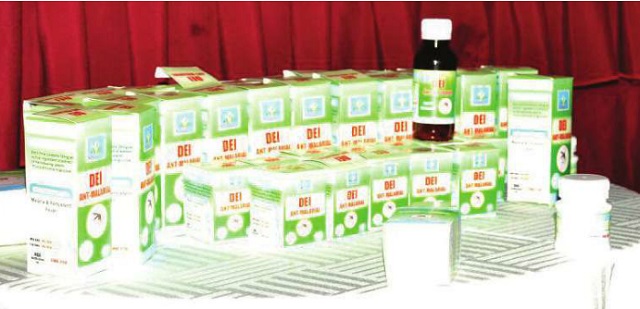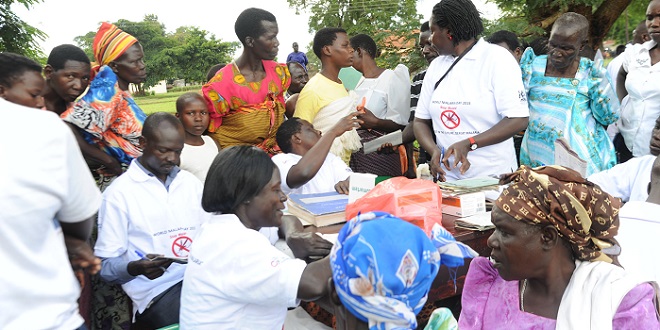Scientists study new herbal drug that offers hope in fight against drug resistant malaria
Ugandans treasure herbal medicine. That perhaps explains the many herbalists found almost everywhere in the country. Problem is that the efficacy of most of their concoctions is not verifiable, are of unclear composition, and the ingredients could contain contaminants.
That is why the entry of scientists into the herbal medicine arena, with the promise of standardization, measurable efficacy and safety, is exciting news. This was clearly dramatised at the recent launch on June 15in Kampala of Dei, a herbal-based anti-malarial developed by university based pharmacologists. The former Minister of Health, Dr. Elioda Tumwesigye; who is now Minister for Science, Technology and Innovation, officiated. The Dei drug is made in both capsule form for adults and suspension form for children.

Dr. Paul Bamutaze, a team member at Dei Group of Companies which is being the drug’s development told The Independent that they were motivated by the desire to provide a Ugandan solution to a Ugandan problem.
“People who facilitate Uganda with medicines and vaccines don’t experience the problems that we are facing today,” he said, “We know these problems. We are best suited to offer solutions.”
In Uganda, 95% of the population is at risk of the disease and about 16 million cases are handled every year; between 70,000 and 100,000 of these cases end up in death. Most are children and expectant mothers.Severe malaria also contributes to 30% of all hospital admissions and 10% of all the deaths in the country.
Some of the deaths, according to experts are increasingly being caused by parasites no longer responding to available medicines.For instance, in July last year, when unusual malaria hit Northern Uganda claiming over 600 people, officials at the Ministry of Health told journalists that partly the problem was because parasites were not responding to the recommended first line treatment.
According to Dr. Patrick Ogwang, the lead researcher in its development, the Dei drug could help tackle the problem of drug resistant malaria. Ogwang who has a PhD in pharmacology and is Senior lecturer in the Faculty of Medicine at Mbarara University of Science and Technology says his dream for developing an anti-malarial drug dates back in 2004. He was a pharmacologist at the Ministry of Health and developed a malaria prevention beverage he called Artavol. But he soon realized that what Ugandans needed was a cure for malaria not a preventive beverage.
Ogwang and team conducted their research at three laboratories – Mulago National Referral Hospital, Mbarara University of Science and Technology and at the Makerere University College of Veterinary Medicine.
Ogwang says the initial study involved comparing the effectiveness of Artemisinin based Combination Therapy (ACTs), which are the recommended anti-malaria drugs and Dei in killing plasmodium flaciparum, that parasite that causes malaria. In the laboratory, they found that while ACTs are 78% effective, the herbal extract was more effective at 83%.
Laboratory trials on mice showed Dei provided 10 times more safety than chloroquine which was once the recommended malaria drug worldwide.
The drug is not yet approved for public use but Ogwang told The Independent on June 23 that the drug could be on the market in six months’ time. Quality control tests and trials involving about 60,000 patients have to be done.

Fredrick Ssekyana, the Head of Public Relations at the National Drug Authority (NDA) which must approve Dei says the company has got a notification number which is the initial step in having any drug accepted to be marketed and used in the country. The number; THA218, was issued to Dei Group in July 2014. Ssekyana said the researchers must now comply with other requirements, including scrutiny of the manufacturing plant and processes involved.
“Quality should not just be in the final product but even the processes,” he told The Independent.
Bamutaze says the process of approval is likely to be successful because although Dei group of companies has no history in the drugs area, the drug is being developed under agreement with Kampala Pharmaceutical Industries, a local drug company.
As this story was being written, reports were pouring in of a rise in the number of malaria cases in the Northern Uganda district of Kitgum. Media reports showed that Kitgum hospital records up to six deaths a week.Such reports show the urgency with which effective drugs are needed. Whether the Dei Anti-malarial drug will be that cure, however, awaits its approval by NDA and use in hospitals.
 The Independent Uganda: You get the Truth we Pay the Price
The Independent Uganda: You get the Truth we Pay the Price



